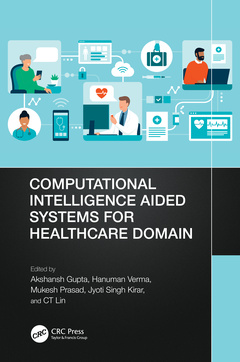Computational Intelligence Aided Systems for Healthcare Domain
Coordonnateurs : Gupta Akshansh, Verma Hanuman, Prasad Mukesh, Singh Kirar Jyoti, Lin CT

This book covers recent advances in artificial intelligence, smart computing, and their applications in augmenting medical and health care systems. It will serve as an ideal reference text for graduate students and academic researchers in diverse engineering fields including electrical, electronics and communication, computer, and biomedical.
This book:
- Presents architecture, characteristics, and applications of artificial intelligence and smart computing in health care systems
- Highlights privacy issues faced in health care and health informatics using artificial intelligence and smart computing technologies
- Discusses nature-inspired computing algorithms for the brain-computer interface
- Covers graph neural network application in the medical domain
- Provides insights into the state-of-the-art artificial intelligence and smart computing enabling and emerging technologies
This book discusses recent advances and applications of artificial intelligence and smart technologies in the field of healthcare. It highlights privacy issues faced in health care and health informatics using artificial intelligence and smart computing technologies. It covers nature-inspired computing algorithms such as genetic algorithms, particle swarm optimization algorithms, and common scrambling algorithms to study brain-computer interfaces. It will serve as an ideal reference text for graduate students and academic researchers in the fields of electrical engineering, electronics and communication engineering, computer engineering, and biomedical engineering.
Chapter 1
Introduction to Computational Methods-Machine and Deep Learning Perspective
Hanuman Verma, Akshansh Gupta, Jyoti Singh Kira, Mukesh Prasad, and C.T. Lin
Chapter 2
Machine Learning Applications in Healthcare
Kushagra Krishnan, Sumit Kumar and Pinki Dey
Chapter 3
Deep Multi-view Learning for Healthcare Domain
Vipin Kumar, Bharti, Pawan Kumar Chaurasia and Prem Shankar Singh Aydav
Chapter 4
Precision Healthcare in the Era of IoT and Big Data: Monitoring of Self-care Activities
Sujit Bebortta and Dilip Senapati
Chapter 5
Machine learning approach for classification of stroke patients using clinical data
Rafiqul Islam and Bharti
Chapter 6
A Comparative Analysis of noise robust Fuzzy Clustering Algorithms for Medical Image Segmentation
Inder Khatri, Dhirendra Kumar and Aaryan Gupta
Chapter 7
Exploring the role of AI, IoT and BC during Covid-19: A bibliometric and network analysis
Parul Khurana and Kiran Sharma
Chapter 8
Biomedical Named Entity Recognition using Natural Language Processing
Shaina Raza, Syed Raza Bashir, Vidhi Thakkar and Usman Naseem
Chapter 9
Image segmentation of skin disease using deep learning approach
Manbir Singh and Maninder Singh
Chapter 10
Multimodality dementia detection system using machine and deep learning
Shruti Srivatsan, Sumneet Kaur Bamrah and K.S. Gayathri
Chapter 11
Heart Attack Analysis and Prediction System
Ashish Kumar Das, Ravi Vishwakarma, Adarsh Kumar Bharti, and Jyoti Singh Kirar
Chapter 12
Utility of Exploratory Data Analysis for Improved Diabetes Prediction
Udita Goswami, Yashwaswa Verma, Anwesha Kar and Jyoti Singh Kirar
Chapter 13
Fundus Image Classification for Diabetic Retinopathy Using Deep Learning
Monika Mokan, Soharab Hossain Shaikh, Devanjali Relan and Goldie Gabrani
Chapter 14
Emerging role of Artificial intelligence in precision oncology
Vinod Kumar Singh
Chapter 15
Artificial Intelligence in Precision Oncology
Ranjeet Kaura, Sabiya Fatima, Amit Doegara, C. Rama Krishan and Suyash Singh
Chapter 16
Computer-Aided Breast Cancer Diagnosis using Machine Learning and Deep Learning methods: A Comprehensive Survey
Ritika Singh, Vipin Kumar, Prashant Prabhakar and Ibrahim Momin
Chapter 17
Complex dynamical interplay of health, climate and conflicts with data driven approach
Syed Shariq Husain
Dr Akshansh Gupta is a scientist at CSIR-Central Electronic Engineering Research Institute Pilani Rajasthan. He has worked as a DST-funded postdoctoral research fellow as a principal investigator under the scheme of the Cognitive Science Research Initiative (CSRI) from the Department of Science and Technology (DST), Ministry of Science and Technology, Government of India, from 2016 to 2020 in School of Computational Integrative and Science, Jawaharlal Nehru University, New Delhi. He has many publications, including Springer, Elsevier, and IEEE Transaction. He received his master's and a PhD degree from the School of computer and systems sciences, JNU, in 2010 and 2015, respectively. His research interests include Pattern Recognition, Machine Learning, Data Mining Signal Processing, Brain Computer Interface, Cognitive Science, and IoT. He is also working as CO-PI on a consultancy project named "Development of Machine Learning Algorithms for Automated Classification Based on Advanced Signal Decomposition of EEG Signals" ICPS Program, DST Govt. of India.
Dr Hanuman Verma received the PhD and M.Tech degrees in Computer Science and Technology from the School of Computer and Systems Sciences (SC&SS) at Jawaharlal Nehru University (JNU), New Delhi, India, in 2015 and 2010, respectively. He also did his master of Science (M.Sc.) degree in Mathematics & Statistics from Dr R. M. L. Avadh University, Ayodhya, Uttar Pradesh, India. He has worked as a junior research fellowship (JRF) and senior research fellowship (SRF) from 2009 to 2013, received from the Council of Scientific and Industrial Research (CSIR), New Delhi, India. Currently, he is working as Assistant Professor at the Department of Mathematics, Bareilly College, Bareilly, Uttar Pradesh, India. He has published research papers in reputed international journals, including Elsevier, Wiley, World Scientific, and Springer, in machine learning, deep learning and medical image computing. His primary resea
Date de parution : 06-2023
15.6x23.4 cm
Thèmes de Computational Intelligence Aided Systems for Healthcare... :
Mots-clés :
Artificial Intelligence; Brain Computer Interface; Nature Inspired Computing Algorithms; Blockchain; Graph Neural Network; MRI Brain Image Segmentation; Deep Boltzmann Machines; Dl Model; Deep Learning Models; Random Forest; Precision Oncology; Convolutional Layer; Deep Learning Algorithms; Supervised Machine Learning; IFS Theory; CNN Architecture; IFS; Random Forest Classifier; UCI Ml Repository; Support Vector Classifier; KNN Classifier; Support Vector Machine; Image Segmentation; Intuitionistic Fuzzy; EEG Signal; Diabetes Prediction; UCI Machine; Mri Dataset; Max Pooling Layer; IoT Device



